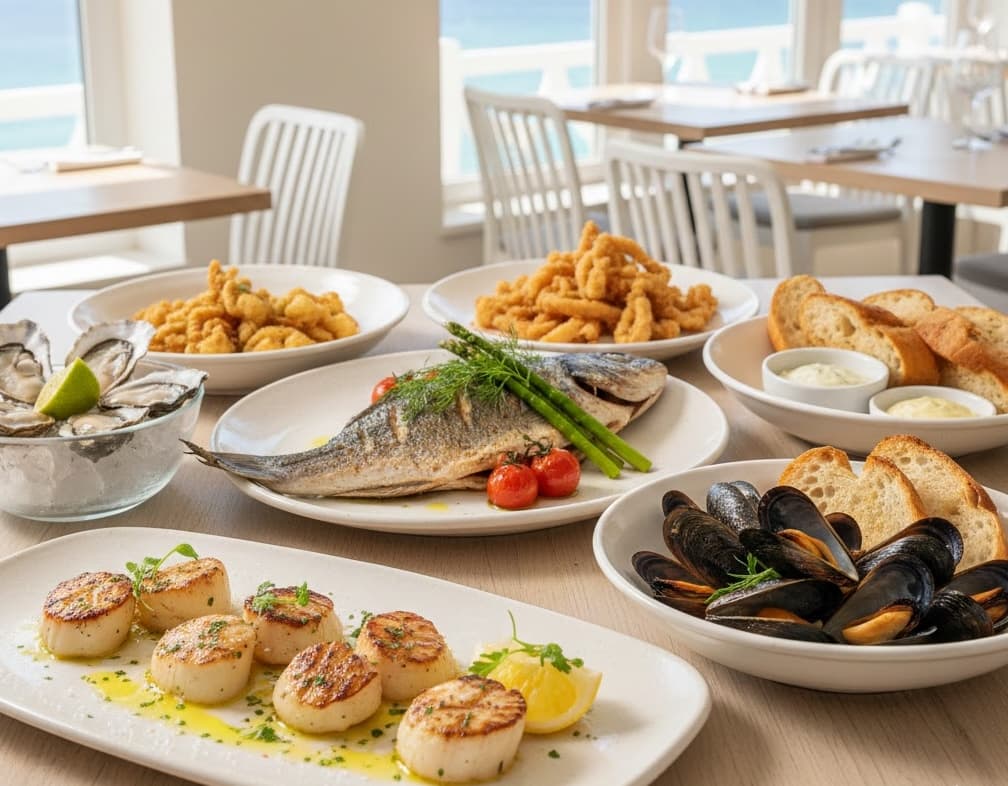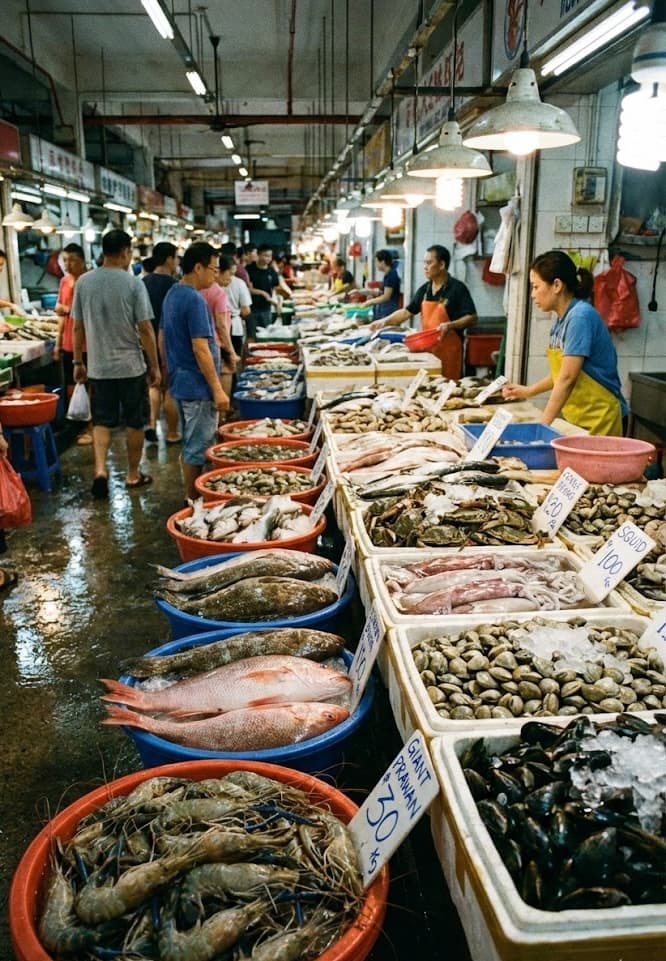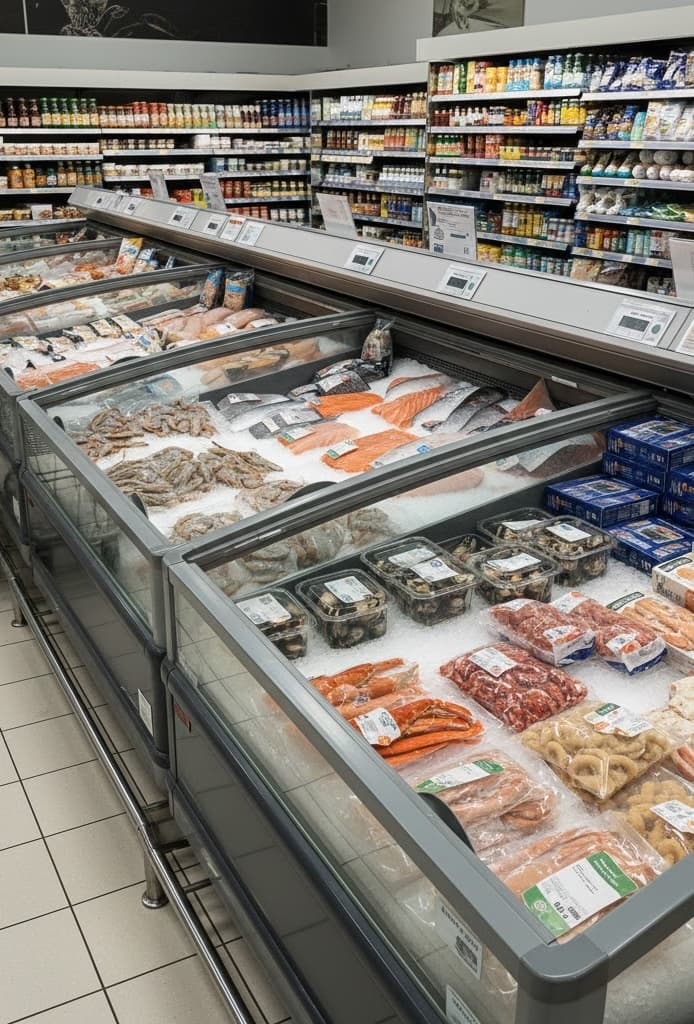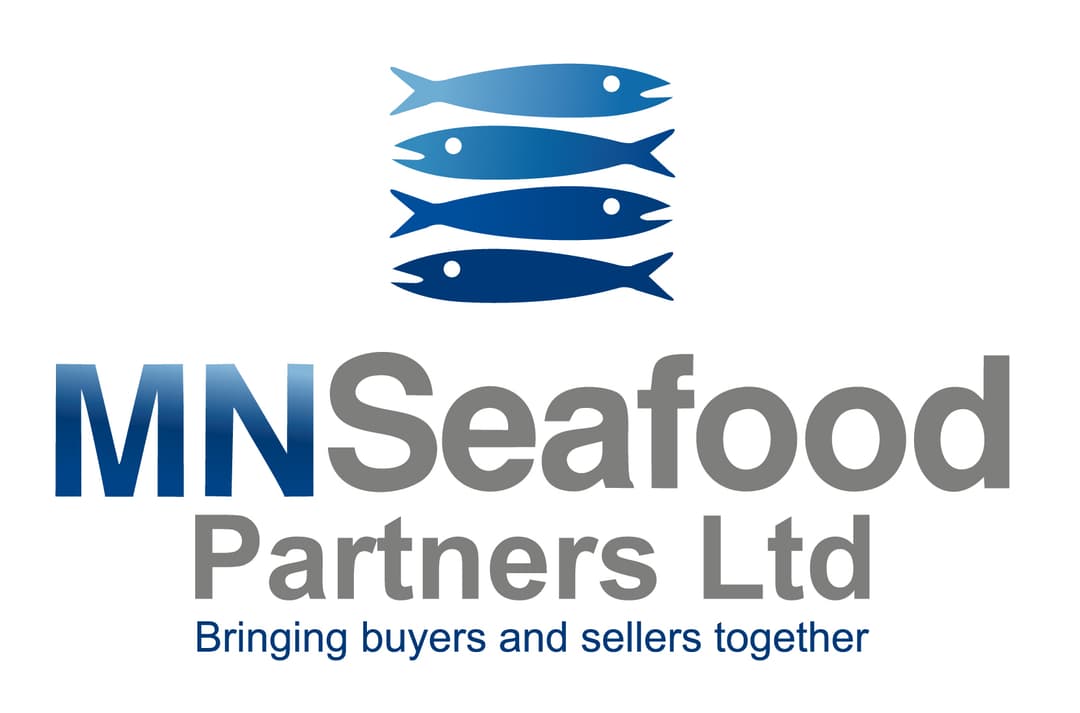The Seafood Industry: What's Going On Beneath the Surface
Behind that vibrant tableau, the tides of demand, innovation, and responsibility are changing. Take a friendly, behind-the-scenes dip with this article through the six giant forces remaking seafood today.

200+ buyers trust Torg for sourcing


Riding the Wave of Appetite and Evolving Tastes
Over the last few decades, people’s love affair with seafood has only deepened. Why? Partly because they’re more nutrition-savvy than ever: those omega-3s in salmon and the lean protein in shrimp have become culinary status symbols for anyone chasing healthier, stronger lives. But it’s not just about stats on a nutrition label.
From California sushi restaurants to Spanish tapas restaurants serving up octopus, consumers are venturing out into new flavors at home and overseas. Suddenly, calamari is not just an appetizer, it's a topic of conversation. And that worldwide palate means manufacturers and retailers are scrambling to stock everything from Caribbean lionfish (an invasive species turned gourmet delight) to Scandinavian smoked trout. It's a tasty time to be a seafood supplier.
Sailing Toward Sustainability and Stewardship
But let's be real: that plate of dinner can cost something. Overfishing, coral reef destruction, and climate-related changes to ocean temperatures are very real threats. It's borrowing from the seafood bank of tomorrow to meet the appetite for today. The silver lining? A sea of responsible consumers are calling for change. These Marine Stewardship Council (MSC) or Aquaculture Stewardship Council (ASC) labels have become marks of prestige on shop shelves, assuring consumers that their purchase isn't draining wild supplies or poisoning the waterways.
In the ocean, farmers and fishers are also adjusting. Most fishing fleets now employ selective nets and real-time satellite monitoring to exclude juvenile catches and safeguard vulnerable species. At the same time, aquaculture farms (salmon pens to seaweed farms) are testing closed-loop systems that recycle water and nutrients. It's a significant challenge, but with each responsibly harvested crop, we move closer to reconciling human needs and healthy oceans. Explore more salmon suppliers here.
Mapping Every Catch with Tech-Enabled Traceability
Ever wondered if that "wild-caught" tag is actually legit? Technology is moving in to verify or debunk such claims. Blockchain, AI, and mobile apps are creating a digital web that tracks every fish from sea to plate. Picture scanning a QR code on your seafood package and getting an instant snapshot of where, when, and how it was caught, or what feed went into those farmed tilapia (check out some tilapia suppliers here). This openness not only makes one trustworthy but also puts seafood cheats who combine lower-priced fish under more expensive names in their place.
The Growing Wave of Aquaculture and Alternative Proteins
Wild fisheries can't keep up with worldwide appetites on their own. That's where aquaculture (fish farms, essentially) enters the picture, already producing more than half of all seafood we consume. Tilapia cages in lake freshwater, offshore salmon pens, and even land-based recirculating systems are expanding rapidly. But expansion comes with new challenges: waste management, disease management, and escape of non-native species. The solutions vary from probiotic-rich feeds to integrated multi-trophic systems where shellfish and seaweed clean fish farm effluents.
And then there's the frontier of alternative proteins. Plant-based "shrimp" that actually sear and sizzle on the grill, or salmon cells grown in bioreactors, these technologies hold out the promise of zero-bycatch, zero-habitat-loss seafood. Admittedly, some of these products are still rough around the edges when it comes to texture and flavor, but they're quickly taking hold in test kitchens and food halls. If you’ve ever wondered what the future of fish tacos might look like, plant and cell-based creations are paddling right up the menu.

Riding the Health and Wellness Wave
Seafood's secret strength is still wellness. Omega-3 fatty acids, lean proteins, vitamin D—it's a nutritional triple play that health experts praise. Yet consumers today demand more: reduced sodium, organics, and guarantees that no antibiotics or hormones rode into the feed on their coattails. Producers are reacting with "clean-label" offerings: wild-caught cod with only a touch of sea salt, farm-raised trout raised on non-GMO feeds, or ready-to-eat poke bowls featuring local, seasonal fish.
This is not just marketing hype. A latest dinner party involved a rainbow of seafood spreads (smoked oysters, ceviche, and mackerel pâté) and all the guests were commenting on how fresh and unadorned the ingredients were. It's evidence that to let the fish be the best advocate in an era of health-conscious consumers can be the most powerful marketing in this marketplace.
Casting Nets into New Culinary Ventures
And last but not least, we can't overlook the spice rack of international flavors guiding seafood's evolution. Feeling like whipping up a spicy sambal-seasoned prawn stir-fry? Or tasting Nordic gravity-smoked herring? Chefs and home cooks these days are combining terroir with tides, culling flavors from East Africa's coconut curries to the Baltic's dill-fragrant gravlax. Even obscure species (such as Atlantic mackerel or Pacific sablefish) are having their time in the sun as intrepid eaters seek out more than cod and salmon.
This trend is not exclusive to upscale restaurants. London street food stalls offer octopus sliders, New York food trucks serve kimchi-topped fish tacos, and home cooks are playing around with flavored brines and homemade fish jerky from the best fish jerky suppliers. By embracing this culinary diversity, the seafood industry not only pleases palates but also relieves pressure on overfished favorites.
Wrapping Up
The international seafood industry is bigger than a supply chain; it's an ever-changing world of nature, culture, and commerce. Whether you're a home cook, a restaurateur, or just someone who enjoys the bounty of the ocean, knowing these currents makes people all better, wiser, and more responsible consumers. So the next time you enjoy a piece of fish or shellfish, remember: you're part of a story that spans tides and traditions, and the adventure has only just begun.
Meet Torg's Top Seafood Suppliers

PT Bahari Biru Nusantara
Company Name: PT Bahari Biru Nusantara
Headquarters: Lamongan, East Java, Indonesia
Core Products: Sustainably Sourced Indonesian Seafood
In Lamongan, East Java, PT Bahari Biru Nusantara is making seafood premium and while being friendly to the planet. The company collaborates directly with local fishermen, not only to harvest what's plentiful, but also to preserve what's vulnerable. Its mission is plain: get responsibly caught Indonesian seafood to the world without sacrificing the ecosystems it's harvested from.
Their BRC Food, HACCP, and GMP-certified wild-caught reef fish and cephalopods are processed under the highest international standards for safety and quality, but compliance is not the bottom line. It's something greater. It's about balancing commerce with conservation.
PT Bahari Biru Nusantara is not pursuing volume. It's creating a stronger supply chain, where fair relationships, ocean stewardship, and clean sourcing practices harmonize. For chefs and buyers seeking seafood that bears a story of care and origin, this is where tradition and accountability meet.

MN Seafood Partners: Connecting the UK Seafood Supply Chain
Company Name: MN Seafood Partners
Headquarters: United Kingdom
Core Products: Over 50 seafood and shellfish species
Founded in 2017, MN Seafood Partners Ltd has grown into a trusted sales and export agency at the heart of the UK seafood trade. Based in Plymouth, the company connects a select group of UK suppliers with over 200 buyers across the UK and Europe, with a strong presence in France, Spain, and Italy.
With over 40 years of industry experience behind the team, MN Seafood Partners offers a streamlined solution for both suppliers and buyers. They handle the complexities of pricing, documentation, logistics, and market access, allowing producers to focus on quality and sustainability.
Their offering includes over 50 seafood and shellfish species, with daily availability updates and early landing information shared with customers. From premium fresh fish to live shellfish and value-added products, the company adapts quickly to customer needs and seasonal variation.
What sets MN Seafood Partners apart is their personalised, bilingual service, deep market knowledge, and commitment to transparency. Their approach reflects a modern, nimble business model rooted in long-term relationships and pragmatic growth.
As demand for responsibly sourced seafood continues to rise, MN Seafood Partners is well-positioned to keep building connections, and value, throughout the supply chain.

DC Fishing
Company Name: DC Fishing
Headquarters: Cape Town, South Africa
Core Products: Fresh Hake & Hake Fillets, Yellowtail, Tuna
DC Fishing is more than just a seafood company, it’s a family-driven business with deep roots in South Africa’s proud fishing heritage. The vision: to responsibly harvest the best of the South Atlantic and bring premium-quality fish to markets worldwide.
Founded in 2009 and based in Cape Town, DC Fishing operates a vertically integrated business model that spans harvesting, processing, cold storage, and distribution. This hands-on approach allows them to maintain quality at every stage, ensuring that each product, Yellowtail, Hake, Tuna and others, meet international standards and satisfies global demand.
What sets DC Fishing apart is not just their strong presence in the fishing industry, but their commitment to ethical sourcing and sustainable practices. The company works by the South African Department of Forestry, Fisheries, and the Environment regulations, and places great importance on traceability and responsible quotas.
Over the years, DC Fishing has built a strong reputation in both local and international markets. Their experienced team, long-standing trade relationships and dedication to quality continue to drive their growth, always anchored in the belief that good seafood starts with respect for the ocean and the people who depend on it.

CrawFish Farm Holland
Company Name: CrawFish Farm Holland
Headquarters: Moordrecht, South Holland, Netherlands
Core Products: Wild-caught Dutch crayfish
CrawFish Farm Holland (CFFH) is a Dutch company dedicated to turning an ecological challenge into a culinary opportunity. Founded in 2021, CFFH focuses on the sustainable harvesting of the invasive American crayfish from Dutch waters. By collaborating with local professional fishermen and operating under their fishing license, they ensure a consistent supply of high-quality crayfish. These crayfish are meticulously cleaned, sorted, and prepared for consumption, offering a pure, natural product free from additives, pesticides, or antibiotics. Their commitment to sustainability extends to their packaging, which is designed to minimize environmental impact.
CFFH supplies its premium crayfish to a diverse clientele, including restaurants, caterers, wholesalers, and individual consumers. Their products are praised by chefs for their quality and freshness, making them a sought-after ingredient in various culinary creations.
By promoting the consumption of these invasive crayfish, CrawFish Farm Holland not only offers a delicious product but also contributes to the restoration of local ecosystems. Their mission exemplifies how responsible food production can align with environmental stewardship.

Richard Haward’s Oysters
Company name: Richard Haward’s Oysters
Headquarters: West Mersea, Essex, United Kingdom
Core Product: Native oysters, rock oysters
Richard Haward’s Oysters is a family business with roots that go back over 250 years in the quiet coastal town of West Mersea. They’ve been farming oysters in the Blackwater Estuary for eight generations and they’ve stuck to what works: simple, sustainable, and hands-on oyster growing.
Their Mersea Native oysters are full of salty, ocean flavor, while the Mersea Rock oysters offer a creamier, meatier bite. All of their oysters are hand-picked and cleaned right on site, so you’re getting them fresh and full of character.
This isn’t factory seafood. It’s the result of years of care, local knowledge, and deep respect for the sea. Whether you’re slurping them raw or adding them to a dish, these oysters bring the real taste of the Essex coast straight to your plate.

PT Era Mandiri Cemerlang
Company Name: PT Era Mandiri Cemerlang (EMC)
Headquarters: Jakarta & Malang, Indonesia
Core Products: Frozen and fresh seafood, tuna, mahi-mahi, swordfish, grouper, snapper, squid, octopus
PT Era Mandiri Cemerlang (EMC) is a reliable name in Indonesian seafood for dependable sourcing and sound partnerships since the year 2000. Having HACCP and BRC-certified plants in Jakarta and Malang, they process more than 20 metric tons of seafood per day, supplemented by a 300-ton cold storage facility to maintain every order fresh.
Their product line includes tuna, mahi-mahi, snapper, squid, and beyond, harvested directly from regional fisheries. EMC is also a participant in a certified Fishery Improvement Project (FIP), demonstrating their dedication to sustainable, responsible operations.
They blend traceability, meticulous logistics, and actual industry standards to provide consistent quality to international buyers. EMC is not merely exporting seafood; they're guarding the future of it.

Boquerones Solevante
Company name: Boquerones Solevante
Headquarters: Monòver, Alicante, Spain
Core Products: Marinated boquerones,roasted capellá, gildas, herring, salted fish salad (hueva, mojama, and cod)
Boquerones Solevante is a family-run, third-generation seafood company on Spain's coastal Alicante. Famous for their original marinated boquerones, anchovies marinated in vinegar and made using traditional family methods, they've established a reputation by holding firm to authentic Spanish taste while ensuring consistent quality.
Their offerings also comprise roasted capellá, fish salads marinated in salt, and tapas skewered such as gildas and herring marinated. These products are primarily sourced from the Cantabrian Sea and capture coastally rooted heritage and several decades of hands-on experience.
Whether a small tub for domestic kitchens or larger packs for restaurants, Boquerones Solevante is proud to provide authentic, honest food, made with love, packed with taste, and based in Spain's seafood heritage.

NIGEL
Company Name: NIGEL
Headquarters: Portugal
Core Products: Frozen seafood and fish products
NIGEL has been in the seafood game since 1958, operating right by one of Portugal’s busiest fishing harbors. They specialize in processing and freezing top-quality fish and seafood for both local and international markets.
With exports reaching over 20 countries across five continents, NIGEL combines decades of expertise with a flexible production setup designed to meet diverse market needs. Their dedicated quality control team, ongoing staff training, and strict HACCP standards (alongside IFS FOOD certification) underscore their commitment to excellence.
For buyers seeking reliable frozen seafood with consistent quality and global reach, NIGEL is a smart, seasoned choice.
Request a Bulk Order Quote
Simple ordering, transparent pricing, delivered straight to your door

